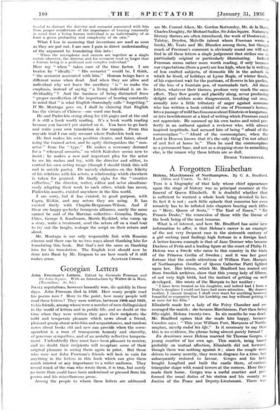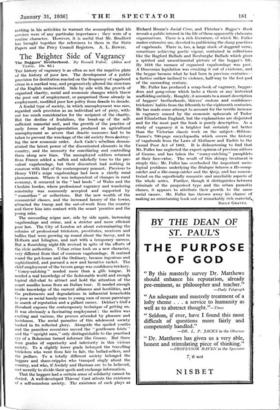A Forgotten Elizabethan
Helena, Marchioness of Northampton. By C. A. Bradford. (Allen and linwin. 7s. 6d.)
Tins is a biography of that lady whose chief appearance upon the stage of history was as principal mourner at the .
funeral of Queen Elizabeth. It is doubtful whether that is suffieient to warrant a whole book being devoted to her. In fact it is not ; each little episode that concerns her even remotely has to be inflated into chapters bearing such titles as " Mary, Queen of Scots," " The Earl of Essex," " Sir Francis Drake," the connexion of these with the theme of the book being of the most tenuous. What is of interest, and here Mr. Bradford has some'-new information to offer, is that Helena's career is an example of the not very frequent case in the sixteenth century of a girl seeking (and finding) high fortune in a foreign land. A better-known example is that of Jane Dormer who became Duchess of Feria and a leading figure at the court of Philip II. Helena was a Swede who came to this country in the train of the Princess Cecilia of Sweden ; and it was her good fortune that the senile attentions of William Parr, Marquis of Northampton (brother of Queen Catherine Parr) lighted upon her. Her letters, which Mr. Bradford has routed out from Swedish archives, show that this young lady of fifteen, of not very high birth, had the instinct of getting on well developed. She wrote of the Marquis to her mother : " I have been treated as his daughter, and indeed had I been a Duke's daughter I could not have had more attention. My dearest mother, I cannot imagine I shall ever want for anything however beautiful or expensive that his Lordship can buy without getting it at once for his Elia."
Elizabeth made her a lady of the Privy Chamber and en- couraged the match ; she became Marchioness, Parr then being fifty-eight, Helena twenty-two. In six months he was dead. Mr. Bradford opines that she made him happy, because Camden says : " This year William Parr, Marquess of North- ampton, sweetly ended his life." Is it necessary to say that this is no evidence, the phrase being almost purely formal ?
En dettsiemes notes Helena married Sir Thomas Gorges, a young courtier of her own age. This match, being based probably on mutual affection, Elizabeth did not forward, though there was nothing against it ; since the couple were driven to marry secretly, they were in disgrace for a time, but subsequently restored to favour. Gorges and his lady bought Longford and built the castle there, of curious triangular shape with round towers at the corners. Here they grade their home. Gorges was a useful courtier and per- formed the usual duties of his station and his county. as Justice of the Peace and Deputy-Lieutenant. There was
nothing in his activities to warrant the assumption that his services were of any particular importance ; they were of a routine character. However, it is useful that Mr. Bradford has brought together the references to them in the State Papers and the Privy Council Registers. A. L. ROWSE.











































 Previous page
Previous page